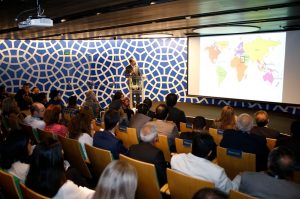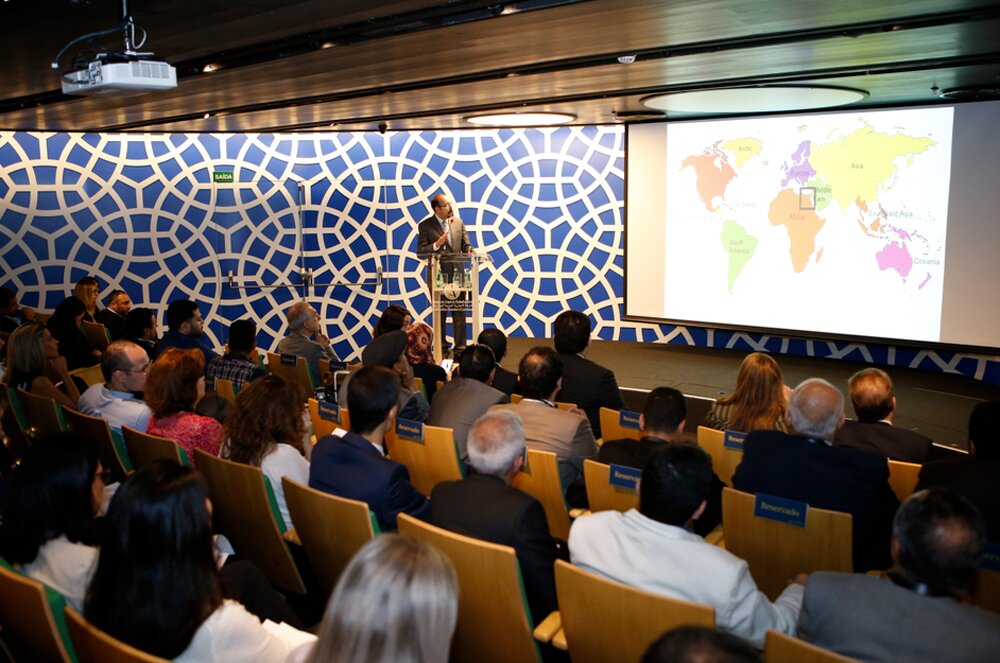São Paulo – Brazilian and Egyptian companies interested in benefiting from the tariff reduction contained in the free trade agreement between Mercosur and Egypt need to issue a preferential certificate of origin,. This document and the agreement were discussed in a meeting that took place this Thursday (05) morning at the Arab Brazilian Chamber of Commerce in São Paulo. It gathered authorities from Egypt and business owners from both countries.

For Egyptians exporting to Brazil, the certification is issued by the General Organization for Import and Export Control (GOEIC). In Brazil, many organizations can issue it and their names are listed by the Ministry of Development, Industry and Foreign Trade (MDIC). To receive the certification, the companies need to provide certain information that will inform authorities which type of tariff reduction will be assigned to the product.
The free trade agreement between Brazil and Egypt went into effect at the end of last year. In an interview to ANBA, the director general of International Agreements of Egypt’s Ministry of Trade and Industry, Michael Gamal Kaddes, said that, a year from now, the trade between Brazil and Egypt will have grown in more than 20%, boosted by the agreement.
The products included in the Mercosur-Egypt agreement were divided in five lists and those in the first list are exempt of tariffs, according to Riham Ragras, manager of International Agreements of Egypt’s Ministry of Trade and Industry.
This first list has 421 are types of machinery and equipment, 403 are chemicals and 238 are agricultural goods. Each type has a NCM (Mercosur Common Nomenclature). The second list includes products with tariffs that, in fours years, will be brought to zero, with 25% reductions yearly. From the Egyptian goods included in this category, 109 are textiles and apparel and 91 are chemicals.
The products in the third list will have their tariffs brought to zero in an eight-year period, with a yearly reduction of 12.5%. From these, 330 are textiles and clothing, 265 are machinery and equipment, 178 are chemicals and 115 are agricultural products.

The products in the fourth list will see a reduction of 10% in their import tariff yearly until getting to zero in a ten-year period. From these, 300 are clothing and textiles, 105 are equipment and machinery and 101 are chemicals. The fifth list is still being discussed by a special committee.
The special certification of origin can be issued after the shipping of the goods, according to Kaddes, and will carry a 180-days expiration date. However, the issuance of this stamp doesn’t exclude the need of a certification of origin issued by the Arab Chamber to exports to Egypt, as stated by the organization’s CEO, Michel Alaby.
Investments in Egypt
The meeting was attended by Brazilian business owners, who asked questions on the Mercosur-Egypt agreement. In the event, the economic points that make Egypt an attractive destination for foreign investments were presented. The vice CEO of the Egyptian General Authority for Investment (GAFI), Mohamed Absul Wahab, talked about the latest improvements of the Egyptian economy, such as the growth of 4.16% of the Gross Domestic Product (GDP) last year and the growth forecast of 5.17% for this year.
Egypt received USD 7.9 billion in foreign direct investment (FDI) in 2017, which sets it in the 29th position among the FDI receiving countries. And, according to Wahab, its stock exchange grew 19%. New free trade, investment and technology zones were created, plus a new legislation on renewable energy and the improvements in the Suez Canal.
A new legislation for foreign investment was also passed. According to Wahab, the opening of a foreign company in the country can now be done in one day, with the licenses coming in three weeks. The country also created a 24-hours committee, with services in Arabic and English, to solve problems and give support to foreign investors.
The Arab Chamber’s president, Rubens Hannun, who opened the meeting, said that he can sense the enthusiasm on Egypt’s side with the trade relations with Mercosur and praised the Egyptian significant participation in the Brazil-Arab Countries Economic Forum that took place this Monday (02) in São Paulo. “The possibilities are countless, we can’t waste time with barriers and doubts,” said Hannun in the event, which was organized exactly to answer questions and facilitate trade.
Other authorities and entrepreneurs spoke during the meeting. The latter came from sectors such as herbs and spices, apparel and textiles, plastic products, construction material, chemicals, among others, and spoke on their interests in the trade relations with Brazil.
Translated by Sérgio Kakitani




